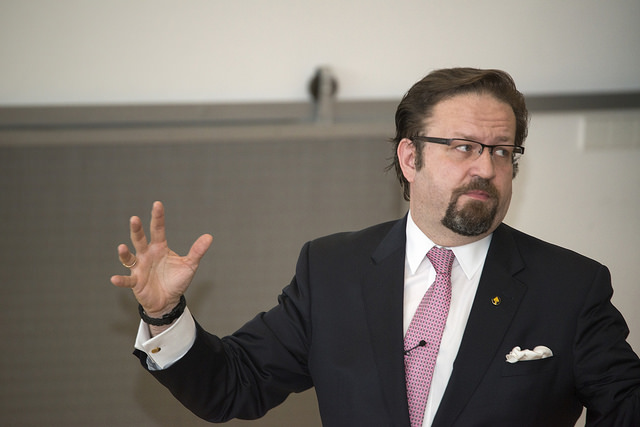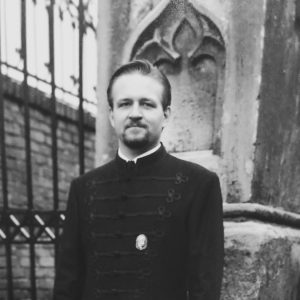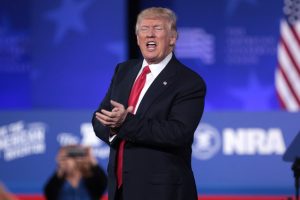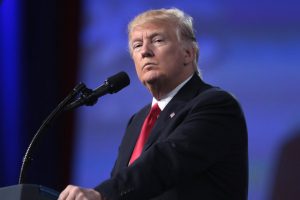by Jim Lobe and Eli Clifton
Yaakov Katz, a top editor at the Jerusalem Post, has announced that he will be directing tough questions at Sebastian Gorka at the newspaper’s annual conference in New York on May 7. In a column published May 1, Katz said that he would not hesitate to take on the many controversies provoked by Gorka’s appointment as deputy assistant to the president, particularly regarding the years the British-born Gorka spent in Hungary and his associations there.
LobeLog first disclosed Gorka’s wearing the medal of Vitezi Rend, a “knighthood” founded in 1920 by Hungary’s outspokenly anti-Semitic leader, Adm. Miklos Horthy, at Trump’s inaugural balls. As such, we would like to submit a series of questions for Katz to address to Gorka.
It’s important to stress that LobeLog and the Forward, whose reporting by Lili Bayer and Larry Cohler-Esses has led the pack in establishing Gorka’s past political associations in Hungary, did not provoke the controversy that ensued. Gorka did that himself by ostentatiously sporting the Vitezi Rend medal in public on Inauguration Day. Then he refused to answer questions from Lobelog and the Forward about the medal and his relationship to Vitezi, which cooperated with the Nazis in deporting Jews and in other ways during World War II. Those who now argue that Gorka’s political ties have been misrepresented or that he is a victim of guilt by association should really look to Gorka himself for failing to respond to relevant questions put to him in a timely and persuasive manner.
Here are some of the key questions that Gorka has so far failed to answer.
- What precisely is your relationship to Historical Vitezi Rend?
You have categorically denied swearing loyalty to the Order, then hedged by saying you were never a “formal member,” and then simply ignored any further questions about your relationship to the group. In the meantime, however, both the Forward and NBC News have gathered considerable evidence about your relationship to Vitezi Rend makes your claim of non-membership—“formal” or otherwise—increasingly unbelievable. That evidence has come in the form of testimony both by senior Vitezi officials and by non-Vitezi citizens who were politically active in a constituency where you ran (unsuccessfully) for mayor in 2006, as well as your periodic sporting of the Vitezi coat of arms and your use of the honorific “v.” in your name.
You and your defenders have often asserted that your wearing of the medal and insertions of the “v.” in your name on important documents, including on your PhD thesis and in testimony before Congress, have been motivated only by your personal desire to remember your family’s sufferings under both the Nazi occupation and the Soviet-backed Communist government that succeeded it. More specifically, you have said that you wanted to honor the memory of your father who was inducted into Historical Vitezi Rend in 1979 in recognition of his anti-Communist activities for which he was imprisoned between 1950 and 1956. But, as noted by The Forward earlier this month, your use of the honorific “v.” dates back well before your father’s death in 2002. Can you explain why?
Moreover, this photograph of you wearing the medal and the traditional bocskai apparently standing outside a church seems to have been taken in your early to mid-20s, a number of years before your father’s passing. Under such circumstances, why would you be wearing the medal? Is it possible that this photo, which appears on your Facebook page, was taken immediately after your own induction—Vitezi induction ceremonies take place in churches—into your father’s Order? Is this your father’s medal or your own that you are wearing there?
- Are you aware, and, if so, when did you become aware of Vitezi Rend’s World War II history and the anti-Semitic acts—some of them truly murderous —undertaken during the war, including the deportations of tens of thousands of Jewish refugees to Nazi-occupied territories even before the Germans ousted Horthy and occupied Budapest in 1944?
If you were so aware, why would you choose among all your father’s possessions his Vitezi medal to wear to commemorate and honor him, or to insert the “v.” in your name — which, according to Vitezi officials can only be done by sworn members, especially after coming to the United States where the State Department had designated the Order as having collaborated with the Nazis during the war?
Did you fail to consider how provocative and insensitive such acts would be for those aware of that history? The Historical Vitezi Rend has, to our knowledge, never renounced the basic principles that were laid out by Horthy himself in 1920 and that still form part of the loyalty oath taken by Vitezi members. To this day, the Order publicly celebrates with a solemn march in February each year the attempted effort by the German Army and Vitezi Rend and other far-right forces to jointly break out of the Soviet Army siege of Budapest. This suggests that many if not most of Vitezi’s leaders and members still believe that it was better to ally with the Nazis (who were rounding up Jews in Budapest and the rest of Hungary at an unprecedented rate at the time) against the forces that would liberate the camps where the Jews were taken.
Yes, a tiny handful of Vitezi members did engage in acts of courage and humanity in protecting Jews during the Nazi occupation. But the historical record establishes quite clearly that key Vitezi members in the Hungarian armed forces and police, if not many civilian members, zealously carried out Nazi orders, resulting in the deaths of hundreds of thousands. To deny their role in bringing about this catastrophe is a form of Holocaust denial on a par with Marine Le Pen’s recent insistence that French had nothing to do with the round up of Jews at Vel d’Hiv.
3. Do you now wish to revise your remarks about the Trump administration’s Holocaust Remembrance Day statement or do you still feel that this criticism is “asinine” and “absurd”? Do you regret your association with Breitbart News insofar as it provided a platform for the alt-right, key elements of which are anti-Semitic?
You have claimed that you are neither a Fascist nor an anti-Semite, let alone a Nazi, and we personally accept that. But you seem to be at best remarkably insensitive to the concerns of Jews about anti-Semitism, especially as it may express itself in various comments by Trump administration officials. Your work as national-security editor at Breitbart, which has billed itself as a “platform for the alt-right,” certainly doesn’t mitigate that impression. And your insistence that complaints by Jewish leaders about the failure to include any mention of Jews and anti-Semitism in the Trump administration’s Holocaust Remembrance Day Statement were “asinine” and “absurd” suggested a degree of hostility and belligerence that caught many by surprise.
4. Can you elaborate on the actions of your father’s family to protect Jews during the Nazi occupation in spite of your father’s apparent decision to omit any mention of it in the Hungarian version of his memoir? Can you explain why there is such a notable discrepancy between the English and Hungarian versions of his book?
You and some of your defenders have often referred back to your father, Paul, who fled to Britain during the 1956 Hungarian uprising, only to return to Hungary with the family in 1992 after the Communist regime collapsed. According to your account, 14-year-old Paul and his family protected Jews during the Nazi occupation of Hungary. Apart from Paul Gorka’s memoir, Budapest Betrayed, however, no known documentary evidence that either Paul or his parents protected Jews during that period has surfaced.
In fact, there are two versions of the memoir. The first was written in English and published in 1986; the second was published in Hungarian 16 years later. Remarkably, the two versions differ precisely on the issue of the Gorka family’s protection of Jews, as first noted by Yale historian Eva Balogh in a longer article rebutting Gorka’s defenders. The only instance in the English version when Paul addresses his family’s alleged protection of Jews appears in the chapter entitled “Interrogation.” In that chapter, he stresses that he believed his interrogator was himself Jewish. Here’s the relevant passage:
During my interrogation, which lasted for several weeks and for several hours each day, I slowly began to discern his background from remarks he made occasionally or from his behaviour and reaction to what I told him. He was a well-educated Jew in his late twenties, who was familiar with literature and with classical music….
During the more routine and boring parts of the long nighttime sessions of interrogation with the man we called “the one with the broken tooth,” I had the opportunity to give details of my curriculum vitae— excluding my resistance activities. I mentioned that, after the Germans occupied Hungary in March 1944, I stood by one of my best schoolfriends who was compelled to wear the yellow star. I took him by the arm and walked with him past the stationary German Tiger Panzers along the main road leading from his home to our school, Budaorsi Street. No harm came to either of us.
…I explained to the interrogator how our family hid the jewellery [sic] of our doctor, who was a very good friend of the family; a convert to Lutheranism, and the holder of the high Hungarian military decoration, the gold medal for the knighthood of the Order of Vitez, for his exemplary bravery during World War One. Because of our activities on behalf of our Jewish friends, I remember that the post-war Jewish help organization, the JOIST, gave my mother food parcels (mostly containing large jars of tomatoes), as an acknowledgement of our assistance to their people in need and in danger.
I am almost certain that “the one with the broken tooth” – himself a Jew – was quietly impressed by my stories and this could have been one of the reasons for his fairly civilized behaviour towards me in spite of the fact that I made no secret—it would have been futile and cowardly to do so—of my strong and determined anti-Communist feelings.
Even though the memoir covers the family’s entire war experience, there is no other mention of its protection of Jews. Also, the Hungarian translation of the memoir, which is otherwise true to the original, makes no mention whatsoever of these “stories,” as Paul Gorka himself puts it. (Thanks to Prof. Balogh, Hungarian-speaking readers can compare the excerpts here.)
The omission of these key passages naturally raises a host of questions: why did Paul decide to omit this part of his account for the Hungarian edition? Were these stories fabricated or embellished in some way with the intention of gaining the interrogator’s sympathy? Is the English account—as opposed to the Hungarian version—reliable? Did he believe the reading public in Hungary would not approve of his family’s protection of Jews as of 2002 (when anti-Semitism was already clearly on the rise?) Does Gorka have any independent knowledge of his family’s activities during the occupation in this regard, or were the stories included in the English version simply passed down as part of the family lore?
Paul Gorka’s book does not come across as either anti-Semitic or philo-Semitic. It appears mostly indifferent on the question. In one other excerpt, Paul appears to consciously separate his family from those Hungarians who indeed were actively engaged in protecting the Jews during the Nazi occupation.
These were the people with left-liberal tendencies, members of former opposition parties who had gone underground, the majority of the Catholic Church and its priests who were actively and indeed officially engaged in the hiding of Jews and residents of Jewish origin.
Clearly, the Gorkas, however sympathetic they may have been to the plight of the Jews, especially under the Nazi occupation, were not so moved as to heed the Church’s call to hide the Jews, although the possibility that they hid jewelry owned by Jewish converts who were Vitezi members cannot be excluded.
These are just a few of the questions that Gorka has simply not explained or whose explanations have been muddled or hedged. Perhaps his Jerusalem Post appearance will provide him an occasion to answer these long-pending questions once and for all, with some independent corroboration and not just his usual bombast and evasion.
Photo of Sebastian Gorka by 7th Army Training Command via Flickr.







Live the guy alone!!!!
Thanks, to everyone at LobeLog for pursuing this important story. PS “jewellery” is just the British spelling of the word.
Here is a question for him: “Is the Muslim Brotherhood our friend or foe? Provide links to the source material that helps you form your views on this!”